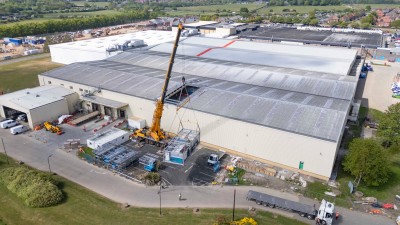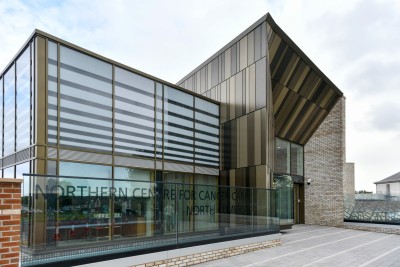Background
The North East and North Cumbria Medicines Manufacturing Centre (MMC) is a flagship initiative led by the region’s Provider Collaborative. The facility is designed to address pressing healthcare and economic challenges by making injectable medicines like chemotherapy and antibiotics.
Located in Seaton Delaval, the MMC received formal approval in September 2024, backed by a £29.7 million investment from NHS England and the Department of Health and Social Care. It is supported by all eight acute and community NHS Foundation Trusts across the region.

Why the MMC was needed
The MMC was established in response to three key challenges:
- Healthcare Efficiency: Hospitals across the region needed a more streamlined approach to producing injectable medicines. Existing aseptic units are operating at or near capacity and nursing staff were spending valuable time preparing medicines rather than delivering care.
- Quality and Safety: There is a growing need to ensure that injectable medicines such as chemotherapy and antibiotics are produced in a sterile, controlled environment to reduce contamination risks and improve patient outcomes.
- Economic Revitalisation: The closure of major employers like Proctor & Gamble had left a significant gap in the local economy. The MMC has offered an opportunity to create skilled jobs and support regional recovery.
Design and development
The MMC was carefully designed to meet strict rules for making aseptic medicines. A company called Merit is building it and work started in 2024. Significant progress has been made with the build and specialist equipment is being installed. The building should be finished and operational later in 2026.
Building the team
Recruitment has been a central focus throughout the project. Key leadership roles have already been filled, including the Head of Quality, Head of Production, Production Manager and Deputy Head of Quality. In March 2025, a Managing Director was appointed to oversee the build, manage recruitment and ensure the facility meets all regulatory requirements ahead of its launch. A number of highly skilled and talented team members have also been appointed from a variety of different backgrounds.
Further recruitment is planned throughout 2025/26, with around 80 staff expected to be hired this financial year and over 150 jobs created in total.
Expected impact
The MMC is projected to release over 2,500 nursing hours per week back to patient care. This means nurses will spend less time preparing medicines and more time with patients, improving both care quality and satisfaction.
Patients will benefit from receiving sterile, high-quality injectable medicines produced in a controlled environment, reducing the risk of contamination and ensuring consistent efficacy.
Economically, the MMC will provide a significant boost to the local area, offering new employment opportunities.
Lessons learnt
Throughout the development of the MMC, several key lessons have emerged:
- Stakeholder Engagement: Maintaining regular communication with stakeholders has been vital. Their involvement has helped secure support, navigate challenges and keep the project aligned with regional priorities.
- Expertise and Commitment: Building a dedicated and skilled team has been essential. The pace of the project has been demanding and ensuring staff wellbeing has been a priority to maintain productivity and morale.
Next steps
As the MMC moves toward completion, the focus for 2025/26 includes:
- Validate the equipment and facilities to ensure safe delivery of medicines and regulatory compliance
- Buy the systems and tools needed to check medicine quality
- Write clear instructions (called SOPs) for how everything will work
- Train new staff so they know how to do their jobs safely and correctly
- Approval and licencing via the medicines regulator the MHRA
What this means for our region
The MMC is a big step forward for healthcare in the North East and North Cumbria. The new facility will help patients get better care, give nurses more time and bring new jobs to the area. It shows what can happen when NHS organisations work together to solve problems, improve lives and is set to make a lasting impact across the region.
Our elective care and recovery programme has been in place for three years. Its core priorities have been to improve access and eliminate long waits. To do this we aim to improve capacity and productivity, system transformation and increasing resilience.
As a region we have strived to create a safe and supportive environment for operational teams to openly discuss challenges, share learning and seek support. This has involved the start of a cultural journey and shift in mindset in how the providers work together, moving away from competition, to building true collaboration and teamworking across organisational boundaries.
Click here to find out what we have done so far and the impact its had on our region.
As a region we helped over 1,000 patients get their treatment sooner in 2024.
The Mutual Support Framework helps facilitate the easier movement of patients between North East and North Cumbria Providers for their elective care.
To discuss this we're joined by County Durham and Darlington NHS Foundation Trusts Executive Director of Operations Lorraine Nelson and Associate Director of Operations Felicity White.
Lorraine and Felicity talk about how the Mutual Support Framework has helped reduce waiting times across the region.

The ‘portability agreement’ supports the effective temporary movement of staff between organisations across the North East and North Cumbria.
All Foundation Trusts in the region have signed up with the aim of cutting down on the usual lengthy recruitment timelines and support operational service delivery.
Terry Phillips who is the Clinical Network Manager of the North East and North Cumbria Congenital Heart Disease Network as well as County Durham and Darlington NHS Foundation Trust’s General Manager of Children and Young People's Service, Julie Southern. They joined us on NENC Providers Podcast.
Terry and Julie discuss how they used the 'portability agreement' and why there was a need to do so whilst also talking about how their departments/networks benefited and the challenges they faced.

The Northern Centre for Cancer Care is a collaboration between Newcastle Hospitals and North Cumbria Integrated Care which brought all non-surgical cancer services under the same roof for the first time at Cumberland Infirmary.
With an investment of £35million, the centre opened two and half years ago to improve health outcomes for the local population of north Cumbria.
The building is managed by North Cumbria Integrated Care whilst services at the centre are run by Newcastle Hospitals as part of the Northern Centre for Cancer Care.
Development of the centre allows the majority of adult cancer patients in north Cumbria access to state-of-the-art facilities and receive their care closer to home. Previously, patients who required cancer services in north Cumbria had to travel to different parts of the Cumberland Infirmary for treatment with many of the facilities not fit for purpose or were referred to the Freeman Hospital in Newcastle for certain treatments and procedures.
Thanks to the two Trusts coming together they now provide one of the biggest combined cancer treatment services in the country. Each year the team provides around 9,000 radiotherapy treatments and over 10,000 chemotherapy treatments in Carlisle.



